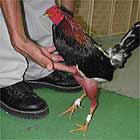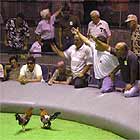|
 |
|
Esta página no está disponible en español. Cultures Clash Over Cockfighting…A Disgusting SportQUOTE:'Training birds to maim and kill each other is not a practice civilized people should be involved in.'
Cultures Clash Over Cockfighting By Matthew Hay Brown | San Juan Bureau JULY 14, 2002
Getting ready. ---------- SAN JUAN, Puerto Rico -- José Roberto Fiejoó remembers it as a highlight of his rural childhood. On weekends, he would follow his father to a barn near their central mountain hometown of Ciales to watch fighting birds bite and claw at each other. Now a labor attorney in San Juan, Fiejoó brings his young son to the Club Gallistico de Puerto Rico, an air-conditioned, brightly lit gallera on the capital's premier tourist strip. There they enter a few of their 200 roosters each week in bloody battles that often end in death. "The first Fiejoó who came here from Spain fought cocks," the broad-chested lawyer says while 11-year-old José Jr. cheers the beginning of another fight at the 400-seat arena. "It is a tradition that has been passed down through the generations." New federal legislation now is threatening that tradition -- and the millions of dollars it pours into the local economy each year. A bill approved by Congress and signed into law by President Bush includes provisions that will sharply limit trade in fighting animals beginning next spring. The new rules alone will not stop the fights on this Caribbean island, one of the few places in the United States where they remain legal. But given the ease with which they passed, aficionados here are concerned that an outright ban -- the ultimate goal of the politicians and organizations that backed the changes -- is only a step away. That specter has roused a deeper grievance, one that resonates beyond the island's 110 licensed cockfighting arenas. Even Puerto Ricans who have no interest in the pastime bristle at politicians they didn't elect passing judgment on a culture they don't understand.
Fight night. ---------- "It is again an increase of the overbearing power of Congress," says labor economist Francisco Catalá. "We are not talking about whether we like cockfighting or not. We are talking about a show of force by Washington against the people of Puerto Rico -- the strong against the weak." Residents of this U.S. commonwealth do not vote for president. Their voice in Congress is limited to a nonvoting delegate to the House of Representatives. That official, Resident Commissioner Aníbal Acevedo Vilá, says he was unable to dissuade colleagues from approving the new regulations. "Puerto Rico simply did not have allies on this theme," Acevedo says. "I confess that it is not an easy issue to defend because they do not understand that there is a cultural difference in Puerto Rico." Some on the island say they would welcome a ban, from wherever it came. "I don't believe torture is art or culture," says Carla Cappalli, president of the Puerto Rico Federation for the Protection of Animals. "This is the remains of an old-fashioned sport that hopefully will fade away, and we'll become a little bit more civilized." It seems unlikely to fade away any time soon. Introduced to the New World by Spanish colonists in the 16th century, cockfighting remains popular throughout Latin America. In Puerto Rico, more than 1.1 million fans attended the nearly 7,000 sanctioned multifight espactáculos staged last year, according to the government office that regulates the industry. Bird owners staked $40.7 million on the more than 167,000 individual fights. Spectators are estimated to have bet eight to 10 times that amount. And officials say the industry provides direct or indirect employment to 40,000 island residents. Supporters say those numbers may prove cockfighting's best protection. "When you have a depressed economy, you don't start tightening strings," says Carlos Martinez Villamil, a breeder and fighter at the Club Gallistico. "We are dealing with quite professional and intelligent people. They cannot be so dumb that they would cancel something that makes money." 'Stop the fight' Martinez, an insurance broker who keeps 500 birds on his San Juan farm, has brought seven to the gallera for this evening's spectacle. Sitting in the first row, he grips the padded gray barrier that encircles the 10-foot ring as he waits for his first fight. The bright orange and blue seats, banked in a steep bowl rising from the green artificial-turf ring, are about half-filled. The spectators include a few women and children, but the crowd is mostly middle-aged and male. A slim young woman in tight jeans and a halter top takes orders for meat-stuffed plantains, piña coladas and Medalla beer. Two combatants -- Martinez's black-and-white-feathered rooster and a golden opponent -- are lowered to the ring and prepared for the fight. Attendants weigh the birds on a balance to show that they are evenly matched, and a judge examines the sharp plastic espuelas that have been lashed to their legs. Handlers tease the roosters, poking each first with a bird-shaped pillow and then with a live bird. The fighters leap at the bird, neck feathers flared and wings flapping. By the time they are locked into the starting box, the riled fighters are banging their beaks on the transparent partition that separates them, trying to peck at each other through the plastic. It's the sort of aggression the gamblers are looking for. From their seats, they call out dollar bets. "100 to 20!" a silver-haired man shouts, indicating Martinez's black-and-white. "Accepted!" a beefy 20-something yells from across the gallera. The older man points at the stranger to seal the wager.
Winning night. ---------- The box is lifted and the birds lunge at each other, launching themselves in leaping attacks, talons out, beaks thrust forward. Martinez's bird lands the first several blows, poking at his opponent's eyes, slashing into his broad breast. The golden squawks and staggers. The black-and-white sinks his bill into the soft tissue at the back of the golden's neck and pulls out a stringy red sinew. Blood oozes down the golden's back. His neck feathers droop. The black-and-white continues pulling chunks of flesh from his neck, and the golden seems unable to do more than throw an occasional kick out at him. Suddenly one of these connects. Almost by accident, the golden drives an espuela deep into the black-and-white's breast and, in a flap of wings and a squawk of loosened feathers, pushes him over backward. And there they remain tangled, Martinez's black-and-white on his back, pedaling his legs helplessly in the air, while the rejuvenated golden, standing on his chest, pecks at his eyes and head and neck. The ringside timer starts the 60-second break clock. Bettors yell out new odds, new wagers. They find few takers. When the black-and-white finally shakes free, he turns from his opponent and runs, trips, stumbles along the barrier, trying to scrabble up and out of the ring. Still the golden pursues him, rides him, claws at his thighs, tears at his back. Martínez has seen enough. He calls over to one of the handlers. "Enough already," he says. "It's over. Stop the fight." Attendants pick some of the larger feathers and bits of tissue from the artificial turf. Another pair of fighters is lowered to the ring, and the spectacle continues. Born for battle U.S. Rep. Earl Blumenauer has never been to a cockfight. "I have no interest in any activity in which animals are maimed or tortured for entertainment," the Oregon Democrat says. "Training birds to maim and kill each other is not a practice civilized people should be involved in." It was Blumenauer who championed the little-noted amendments to the 2002 farm bill that banned interstate and international trade in fighting animals. Cockfighting remains legal in the states of Louisiana, New Mexico and Oklahoma and the territories of Puerto Rico, the U.S. Virgin Islands and Guam. But after the new rules take effect next May, breeders caught carrying fighting birds across state lines will face fines of up to $15,000 and prison terms of up to one year. The extent to which cockfighting in Puerto Rico will be affected is unclear. The spectacles, which use mostly local birds, will continue. But island galleras no longer will be able to host the international tournaments that draw enthusiasts from the Dominican Republic, Mexico, Colombia, Venezuela and Peru. And Puerto Rican breeders will not be allowed to sell their highly regarded birds to the lucrative international market. Carlos Quiñones Figueroa, the island's top cockfighting official, says Americans just do not understand the activity. "The cock is born to fight," says Quiñones, who heads the island Division of Cockfighting Affairs. "What we do is make sure they fight on equal terms." Sanctioned cockfights pit birds of equal age, weight and experience against each other in fights that last 15 minutes or until one is no longer able to continue. Quiñones says that competition between equals is central to Hispanic culture. "It is a part of our literature, it is part of our poetry, it is part of our music," he says. "And it takes place in an environment where people of all ages and social classes can meet and participate." Blumenauer is unimpressed. "People used to beat children," he says. "There used to be slaves. Lots of things were parts of cultures. They changed." News of the legislation hit the island earlier this month. "FEDERAL BLOW TO COCKFIGHTS," the tabloid El Vocero blared in front-page red type, and readers called radio talk shows to register their outrage. Some said they found cockfighting distasteful but considered congressional regulation worse. "It only demonstrates once again the total insensitivity of America to Puerto Rican traditional culture," says the political analyst Juan Manuel García Passalacqua, host of one popular call-in program. García compares the legislation to a federal court ruling last year that allows U.S. judges to impose the death penalty on criminals convicted on the island, even though the Puerto Rican Constitution prohibits capital punishment. Federal investigators reserve the right to use wiretaps on the island, also in violation of local law. And the U.S. Navy continues training exercises on Vieques despite broad opposition. "We are familiar with American insensitivity," García says. Horse racing 'cruel' At the Club Gallistico, a marker board lists the pairings for the three dozen fights on tonight's card. Bird after bird is lowered to the ring and prepared for combat. Martinez, waiting for his next fight, says he once owned a racehorse but gave it up. "If you want to make a comparison, horse racing is more cruel," he says. "You get a guy who weighs 100 pounds, you give him spurs and a whip, you put him on the horse and make it run for all it's worth." "Look at these two," he says, gesturing to two birds pecking and pulling at each other in the ring. "We don't have to do anything. They're going to fight." Martinez calls U.S. attempts to regulate cockfighting in Puerto Rico hypocritical. "If you get involved in this, you have to get involved in thoroughbred racing. You have to get involved in fishing. You have to get involved in hunting. You have to tell all the people in England to stop running around chasing foxes." U.S. officials banned cockfighting in Puerto Rico once before, after taking possession of the island in 1898. Cockfights continued clandestinely until the American governor lifted the prohibition in 1933. Quiñones says a ban now would be similarly unsuccessful. "When the cocks fight legally, we control the licenses, we collect the revenues for the state, we guarantee some jobs, we regulate the security of the gallera, we count attendance, we develop the industry for tourism," he says. "If the cockfights were illegal, the hand of the state would not be involved, and then would come a series of problems." Back in the ring, a fight is delayed when the combatants, both blinded, become separated and are unable to find each other. They pace in circles, stabbing their beaks forward into the darkness. Another clash is over in seconds, when one combatant plunges his bill deep into the neck of the other. The unfortunate falls limp, paralyzed. A third ends with the winner, standing on the chest of his twitching rival, raising his blood-wet head to crow, bewildered, at the cheering crowd he seems only now to have noticed. A small group of Puerto Ricans is pushing to make cockfighting more humane. Cappalli, head of the 50-member animal protection federation, says the approach itself is something of a compromise. "We are opposed to animal fights, but we can't really talk about a ban in Puerto Rico right now because it's such a cultural thing, and there's so much money involved," she says. The federation has won government hearings for several proposals. Among other changes, members want the fights shortened from 15 minutes to 12. They want surprise blood tests for stimulants, and they want children barred from the galleras. "It is a very violent environment," Cappalli says. "It is cruel to animals, but I am more concerned for the people. We believe it creates insensitivity in humans."
Cockfighting A Disgusting Sport Jennie Jimenez JULY 30, 2002 I read the article on cockfights and the laws. I am a New Yorican, born and raised. I think it's disgusting that my people should even be so low-classed as to think that such cruelty is a sport. A quote by labor economist Francisco Catalá says, "We are talking about a show of force by Washington against the people of Puerto Rico." I say that the show of force by these greedy, cold-blooded, immoral Puerto Ricans against defenseless animals is much more of an issue. I totally support this new legislation, but I think it doesn't go far enough. If God being bigger, smarter and mightier than us decided to do that with your children so that the angels could make money on bets, would you still consider him a good God? Not all Puerto Ricans are this savage.
|

 ----------
---------- ----------
---------- ----------
----------